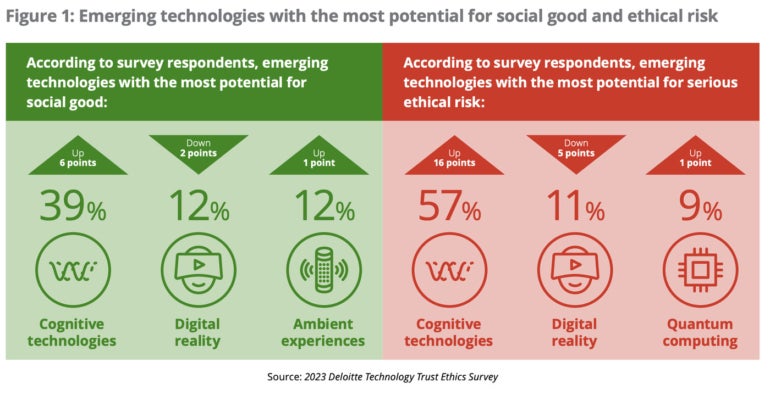
While many companies have been dipping their toes into generative AI pilots, 56% don’t know whether they have ethical standards in place guiding its use, according to a new report from Deloitte.
Almost three-quarters (74%) said their companies have begun testing generative AI, while 65% are already using it inside their businesses and 31% have begun using this technology for external purposes, according to the 2023 State of Ethics and Trust in Technology report.
“We are seeing the adoption of (generative AI) outpacing the development of ethical principles,” Beena Ammanath, managing director of Deloitte Consulting and leader of its Technology Trust Ethics practice, told TechRepublic.
In addition to generative AI, the report also covers which technologies are most likely to pose a serious ethical risk and how much ethical missteps can cost U.S. businesses.
Jump to:
With so many companies testing and using generative AI, “Ideally, we want to see the implementation of emerging technology and development of ethical principles happen hand-in-hand to foster increasing trust in these emerging technologies,” said Ammanath, who is co-author of the report.
Roughly half (49%) of respondents stated their organization has ethical principles defined for AI, and 11% of respondents said their organization has specific ethical principles for other emerging technologies like digital reality, distributed ledger technology, autonomous vehicles, quantum computing, robotics and ambient experiences, she noted.
DOWNLOAD: TechRepublic Premium’s AI Ethics Policy
Deloitte’s research found that the potential for harm increases as technologies grow more powerful. “With the use of emerging technologies accelerating, this underscores the urgency for organizations handling different types of emerging technology solutions to consider the specific risks and ethical concerns unique to their use cases,” the report said.
Cognitive technologies, which include generative AI, have the greatest potential for ethical risk while also having potential for social good, according to Deloitte’s report. This year’s survey found that 39% of respondents indicated cognitive technologies have the most potential for good among all emerging technologies, up from 33% last year.
Yet, cognitive technologies were also ranked as most likely to pose a serious ethical risk among 57% of respondents, compared with 41% in 2022. Other emerging technologies with the potential for serious ethical risk are digital reality (11%) and quantum computing (9%), the report stated (Figure A).
Figure A
“These technologies are nascent and far from full maturity, with many of their capabilities entering testing before governance and regulation can be fully established,” Ammanath explained.
Data is a critical component of cognitive technologies that use large language models, she added. “Unsafe, unsecured technologies can potentially threaten users’ and data subjects’ privacy. Bad actors can also exploit cognitive technologies through techniques like data poisoning, causing technologies to output inaccurate and potentially harmful results.”
Further, “These technologies can also be infamously opaque in their design, making it difficult to judge and assess them for accuracy, robustness, reliability, explainability and other factors,” Ammanath said.
Data privacy was ranked as respondents’ number one concern about generative AI. Despite this, the percentage of respondents who selected data privacy as one of the most important ethical principles for general emerging technologies in their organization dropped from 19% in last year’s survey to 7% this year.
One example of how emerging technologies can be misused is with common surveillance technologies, such as doorbell cameras, which “embed the value of the right to see anything happening in or around one’s property, but they also can infringe on users’ privacy,” the report noted.
Yet, often, the use of such technologies is not for nefarious purposes, so the report points out that “emerging technologies have a range of potential impacts, both beneficial and harmful.” Benefits include quality, speed, safety and/or price.
The damages from ethical missteps can cost U.S. businesses significantly; the Deloitte report cites a study that estimated workplace misconduct cost U.S. businesses $20 billion in 2021. Ethical missteps can have all kinds of repercussions.
For example, companies are responsible for keeping personally identifiable information safe, she said. “A lot of the information that flows through a GenAI model may be sensitive or personally identifiable. Think of medical records. Financial transactions. Product designs. Contract terms. Think of anything you consider private, for whatever reasons matter to you. The controls that keep private data private have to come from the organization, not from the technology.”
“With any technology-related ethical misstep made by organizations, trust that took years to build can erode in an instant,” Ammanath said. This is heightened by the advent of generative AI.
Ignoring or downplaying ethical issues associated with emerging technologies comes at a cost, she stressed. “The potential consequences can include reputational damage,” such as tarnished trust in a brand, “or human damage — including violations of privacy, technology-assisted discrimination, and job displacement.”
Leaders across all business functions need to revisit their skill sets and integrate new abilities to keep up with the fast pace of emerging technology, Ammanath said.
“Become tech fluent — not all leaders need to be technologists, but they do need to become more tech literate so they can pursue business strategies that align with specific business values,” she advised.
Additionally, they should keep their workforce up to speed with reskilling. If professionals show interest in building their technical acumen, leaders should provide them with appropriate training and opportunities to learn on the job, Ammanath said.
“Messaging and education opportunities can come from a centralized point in your organization, such as a chief AI or chief ethics officer,” she noted. “Their office should be supported for long-term success from the organization. In other words, this cannot be a temporary priority.”
Deloitte said it surveyed more than 1,700 business and technical professionals across industry sectors in June 2023.